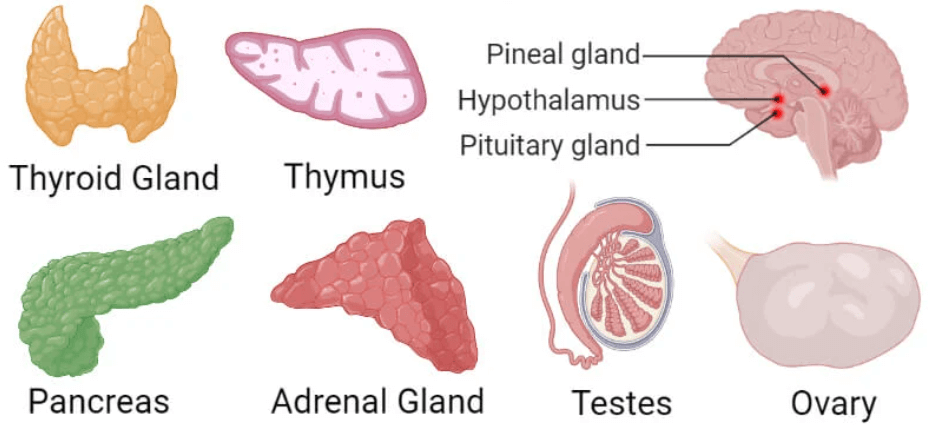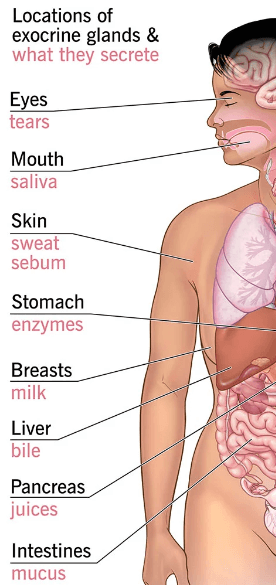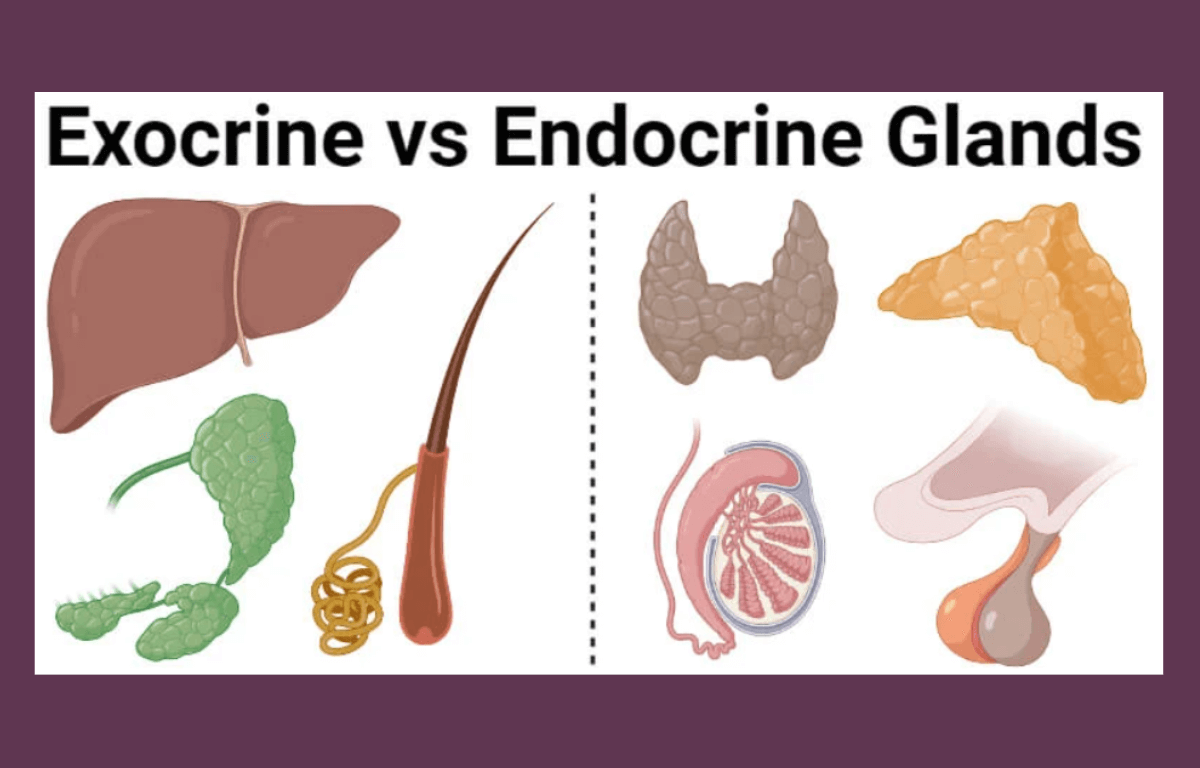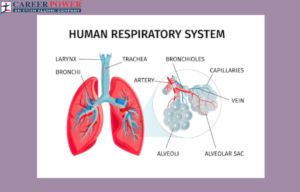Glands are specialized organs that produce and release substances to perform various functions in the body. There are two main types of glands: Exocrine and Endocrine glands. Exocrine glands, like sweat glands, release their secretions through ducts, often onto body surfaces. Endocrine glands, such as the thyroid gland, secrete hormones directly into the bloodstream, regulating body processes. These substances help maintain balance, control growth, and enable communication between cells, ensuring the body functions properly.
Endocrine and Exocrine Glands
The endocrine glands release hormones directly into the bloodstream, influencing distant target organs. Examples include the thyroid and adrenal glands. Whereas the exocrine glands, like sweat or salivary glands, secrete substances through ducts to the body’s surface or into cavities, rather than directly into the bloodstream.
What are Endocrine Glands?
Endocrine glands are special organs in our body that produce and release chemicals called hormones. Unlike exocrine glands, which release substances through ducts, endocrine glands secrete hormones directly into the bloodstream. These hormones act as messengers, traveling throughout the body to regulate various functions and maintain a balanced internal environment. Imagine hormones as tiny traffic controllers that communicate with different organs and tissues, instructing them on how to function. These instructions influence essential processes such as growth, metabolism, mood, and Reproduction. Common endocrine glands include the thyroid, adrenal, and pancreas.

For example, the thyroid gland produces hormones that control metabolism, determining how quickly our body uses energy. The adrenal glands release hormones like adrenaline, preparing us for the “Fight or Flight” response in stressful situations. The pancreas produces insulin, which regulates blood sugar levels.
What are Exocrine Glands?
Exocrine glands are special structures in our body that produce and release substances, often through ducts, to the external or internal surfaces. Unlike endocrine glands that release hormones into the bloodstream, exocrine glands secrete their products directly to specific locations, like the skin or the Digestive tract. You can think of exocrine glands as messengers with packages, sending their goods to specific destinations through channels. Examples include sweat glands, which release sweat onto the skin’s surface, helping regulate body temperature. Another example is the salivary glands, which produce saliva and release it into the mouth through ducts, aiding in the digestive process.

These glands play vital roles in maintaining our body’s balance and ensuring proper functioning. Their secretions often serve protective, lubricating, or digestive purposes. In essence, exocrine glands contribute to the external and internal environments of our body by providing necessary substances where they are needed, helping us stay healthy and function optimally.
Difference Between Endocrine and Exocrine Glands
Endocrine glands release hormones directly into the bloodstream, affecting distant target organs, while exocrine glands secrete substances through ducts body surfaces, or into body cavities. Examples of endocrine glands include the thyroid and adrenal glands, while the salivary glands and sweat glands are exocrine.
| Difference Between Endocrine and Exocrine Glands | ||
| Characteristic | Endocrine Glands | Exocrine Glands |
| Mode of Secretion | Endocrine glands secrete hormones directly into the bloodstream. | Exocrine glands release their products through ducts onto body surfaces or into cavities. |
| Transport Medium | In Endocrine glands, hormones travel through the bloodstream to target organs. | In exocrine glands, products are transported through ducts to specific locations. |
| Distance of Action | Endocrine glands act on distant target organs throughout the body. | Exocrine glands act locally, typically on nearby tissues. |
| Nature of Secretions | Endocrine glands produce hormones, which are chemical messengers. | Exocrine glands produce enzymes, mucus, or other substances. |
| Target Cells | Endocrine glands influence cells with specific receptors for the hormones. | Exocrine glands affect cells in close proximity to the duct opening. |
| Examples | Examples of endocrine glands include Thyroid, Adrenal glands, and Pancreas. | Examples of exocrine glands include salivary glands, sweat glands, and sebaceous glands. |
| Feedback Regulation | Endocrine glands are often regulated by feedback loops involving hormone levels. | Regulation of the Exocrine glands is not typically based on feedback loops. |
| Storage of Secretions | Endocrine glands usually lack extensive storage areas for secretions. | Exocrine glands may have storage areas (e.g., salivary glands) for accumulated secretions. |
| Mechanism of Action | Endocrine glands induce cellular responses through signal transduction pathways. | Exocrine glands function through the direct secretion of products for specific functions. |
| Duct Presence | Endocrine glands lack ducts for secretion. | Exocrine glands have ducts through which secretions pass. |
Importance of Endocrine and Exocrine Gland
Endocrine glands help coordinate and integrate bodily functions, while exocrine glands facilitate external secretion for digestion, temperature regulation, and other essential processes. Both types are indispensable for maintaining homeostasis and overall health. Here we have discussed a few points that highlight the importance of both endocrine and exocrine glands.
Endocrine Glands
- The endocrine glands secrete hormones directly into the bloodstream.
- The endocrine glands regulate diverse physiological processes, including metabolism, growth, and Reproduction.
- Endocrine glands coordinate and integrate bodily functions.
- The endocrine glands act as messengers for long-distance communication within the body.
Exocrine Glands
- The exocrine glands release substances through ducts to external environments or specific organs.
- Exocrine glands play a crucial role in digestion, producing enzymes and digestive juices.
- The exocrine glands aid in temperature regulation through sweat glands.
- These glands provide lubrication for various systems, such as mucous glands in the respiratory tract.
- The exocrine glands contribute to maintaining the body’s overall balance and functionality.



 50 Vegetables Name for Kids in English a...
50 Vegetables Name for Kids in English a...
 Food Chain: Definition, Types, Examples,...
Food Chain: Definition, Types, Examples,...
 Human Respiratory System: Definition, Di...
Human Respiratory System: Definition, Di...













